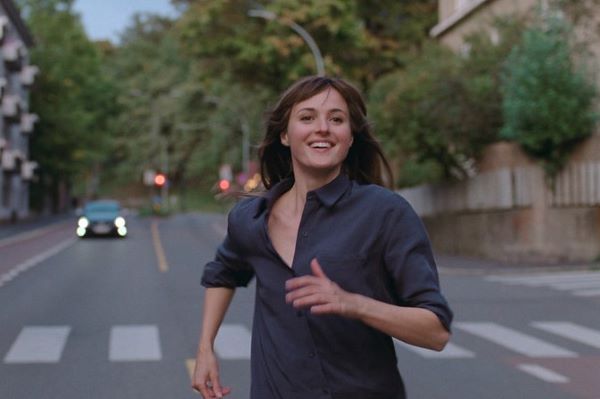Acclaimed writing/directing team Joachim Trier and Eskil Vogt complete an unofficial ‘Oslo’ trilogy with The Worst Person in the World, an unconventional romantic comedy that freshens careworn tropes with inquisitive energy and exuberant style. Wise and irreverent, brutal and compassionate, and hurtling at centrifugal force around a wonderful performance from Renata Reinsve, it captures with sometimes painfully incisive detail the narcissism of self-doubt and the collateral damage that accumulates in the search for contentment.
The film follows Julie (Cannes award-winner Reinsve) over the course of four years as she crosses the Rubicon into her thirties. The only thing she is certain about is her indecisiveness, and she careens wildly between professional aspirations, and the men she meets while chasing those nebulous dreams. A relationship with Aksel (Anders Danielsen Lie), a well-known graphic novelist 15 years her senior offers stability. Of course, restlessness bites and she meets sweet coffee-shop barista Eivind (Herbert Nordrum). Her choice between the two men comes to epitomise the wider question of who she wants to be.
Trier and Vogt’s method of making sense of their messy protagonist is a literary one. Julie’s journey is split into 12 chapters, plus prologue and epilogue. This cleverly allows for various digressions and visual flourishes such as one scene told from different perspectives, the occasional inclusion of voice-over narration, moments of surrealism, and a family montage that puts Julie’s experience of hitting 30 into a historical context – and not a comfortable one. The chapter breaks ensure Trier’s customary experimentation doesn’t come at the expense of coherence or a disruption of rhythm. It also sneakily makes light of a runtime that’s unusually lengthy for the genre.
Not that the film is ever anything approaching a slog, remaining captivating throughout. It’s also blessed with three scenes of individual brilliance that mark it out as something very special. There’s a highly weird and hilarious meet cute between Julie and Eivind, a slightly twisted flirtation that explores the boundaries of what would constitute cheating. There’s a mushroom-fuelled freak-out that culminates in menstrual blood and the detachable arsehole of an animated bobcat. And there’s the sure-to-be-iconic moment of Julie running through Oslo to meet Eivind as the world stops and everyone freezes in time to briefly acknowledge that in this moment she is very much the centre of her universe.
Such moments demonstrate that, while Trier and Vogt may subvert the tropes of the romantic comedy, this is in no way an ‘anti rom-com’. Julie’s dash through Oslo to meet her barista beau is as giddy and heightened as any of the mad sprints through airports, narrative contrivances, or unfeasible declarations of everlasting love that are the genre’s staple fare. It’s just that while the stylistic flair and technical excellence is on a higher level to what you would normally expect, it’s always tempered with a wistful, contemplative awareness of missed chances, roads not taken and the inexorable passing of time. There’s a constant weary wisdom that the genre traditionally sweeps away with grand gestures and explosive kisses in pouring rain. It is romantic, but in the sense of excellent poetry and the reasonable chance of early death.
Reinsve’s beautifully versatile performance keeps everything grounded on a recognisable and plausibly human level, even in its more outlandish moments. Julie may not know what she wants, but she’s confident enough to go looking. She’s a maelstrom of a person, and the effortlessly charismatic Reinsve expresses every nuance and foible of this complicated woman with incredible assurance. Nordrum is a loveable lunk as the uncomplicated Eivind, and long-time Trier collaborator Danielsen Lie is excellent as Aksel, a character of similar complexity to Julie, and clearly a proxy for the writers.
If there is a criticism, it’s that Trier and Vogt may have a better handle on Aksel than they do on Julie herself. There are a few moments where Aksel gets to the crux of the film’s themes more concisely than Julie, and there’s the occasional sense that a man in their forties will see themselves reflected more clearly than a women in her thirties will. The freewheeling narrative is also slowed by an increasingly melancholy inertia that some will see as a sadly sober resolution to such a vibrant story. Still, The Worst Person in the World shows that it’s possible to make something original, refreshing, and profound from familiar elements. Told with inimitable style and a distinctly Scandinavian frankness, it’s likely to very quickly become a modern classic.
Screening as part of Sundance Film Festival 2022
